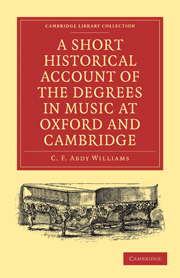 A Short Historical Account of the Degrees in Music at Oxford and Cambridge
A Short Historical Account of the Degrees in Music at Oxford and Cambridge Book contents
- Frontmatter
- PREFACE
- Contents
- CHAPTER I THE ORIGIN OF ACADEMICAL DEGREES IN GENERAL
- CHAPTER II THE EARLIEST RECORDS OF DEGREES IN MUSIC
- CHAPTER III EARLY MUSICAL STUDY AT THE UNIVERSITIES.—BOETHIUS
- CHAPTER IV THE MUSIC ACT, MUSIC SPEECH OR LECTURE, AND MUSIC SCHOOL
- CHAPTER V THE ESTABLISHMENT OF PROFESSORS OF MUSIC AT THE UNIVERSITIES
- CHAPTER VI DEVELOPMENT OF THE MODERN REQUIREMENTS FOR MUSICAL DEGREES
- CHAPTER VII THE CULTIVATION OF MUSIC AT THE UNIVERSITIES
- CHAPTER VIII ACADEMICAL DRESS.—DEGREE CEREMONIES, FEASTS.—AN EARLY EXAMINATION FOR THE B.A. DEGREE
- CHAPTER IX OXFORD GRADUATES IN MUSIC, WITH BIOGRAPHICAL SKETCHES
- CHAPTER X CAMBRIDGE GRADUATES IN MUSIC, WITH BIOGRAPHICAL SKETCHES
- APPENDIX: CONTAINING ACCOUNTS OF THOSE PERSONS WHO ARE MENTIONED IN HISTORY AS GRADUATES, BUT WHOSE NAMES DO NOT APPEAR IN THE UNIVERSITY RECORDS
- INDEX
CHAPTER VI - DEVELOPMENT OF THE MODERN REQUIREMENTS FOR MUSICAL DEGREES
Published online by Cambridge University Press: 05 October 2010
- Frontmatter
- PREFACE
- Contents
- CHAPTER I THE ORIGIN OF ACADEMICAL DEGREES IN GENERAL
- CHAPTER II THE EARLIEST RECORDS OF DEGREES IN MUSIC
- CHAPTER III EARLY MUSICAL STUDY AT THE UNIVERSITIES.—BOETHIUS
- CHAPTER IV THE MUSIC ACT, MUSIC SPEECH OR LECTURE, AND MUSIC SCHOOL
- CHAPTER V THE ESTABLISHMENT OF PROFESSORS OF MUSIC AT THE UNIVERSITIES
- CHAPTER VI DEVELOPMENT OF THE MODERN REQUIREMENTS FOR MUSICAL DEGREES
- CHAPTER VII THE CULTIVATION OF MUSIC AT THE UNIVERSITIES
- CHAPTER VIII ACADEMICAL DRESS.—DEGREE CEREMONIES, FEASTS.—AN EARLY EXAMINATION FOR THE B.A. DEGREE
- CHAPTER IX OXFORD GRADUATES IN MUSIC, WITH BIOGRAPHICAL SKETCHES
- CHAPTER X CAMBRIDGE GRADUATES IN MUSIC, WITH BIOGRAPHICAL SKETCHES
- APPENDIX: CONTAINING ACCOUNTS OF THOSE PERSONS WHO ARE MENTIONED IN HISTORY AS GRADUATES, BUT WHOSE NAMES DO NOT APPEAR IN THE UNIVERSITY RECORDS
- INDEX
Summary
I have already in Chapter ii. treated of the earliest requirements of candidates for Degrees in Music. It remains to trace them down to modern times. Before the passing of Laud's statutes, the conditions seem to have been very indefinite: but these statutes enacted that seven years (the time given to apprenticeship in any trade) should be spent by the candidate in study or practice, before he was allowed to supplicate for the Bachelorship, and a further period of five years before he could obtain the Doctorate. Still, however, nothing is said about any examination or disputation: all that was required of the Oxford candidate seems to have been the composition, to be performed in the Music School, of which three days’ notice was to be given by a “programme” fixed to the great gates of the schools. We find, however, that although not mentioned in the statutes, disputations occasionally took place as a matter of form.
During the eighteenth century, all studies were much neglected at Oxford, and it was not till the beginning of the present century that a fresh start was made by means of new statutes, prescribing the forms of examination, due to the energy of Dr. Eveleigh, Provost of Oriel.
There seems to have been a general depression of learning at Universities during the seventeenth and eighteenth centuries all over Europe.
- Type
- Chapter
- Information
- A Short Historical Account of the Degrees in Music at Oxford and CambridgeWith a Chronological List of Graduates in that Faculty from the Year 1463, pp. 40 - 44Publisher: Cambridge University PressPrint publication year: 2009First published in: 1893


